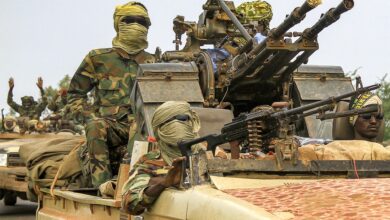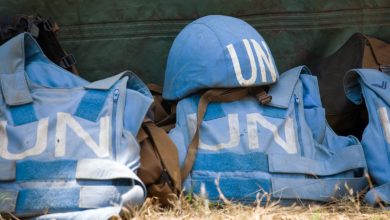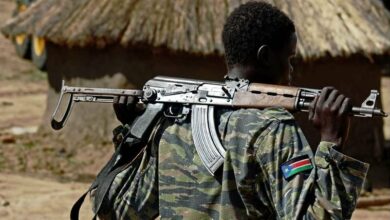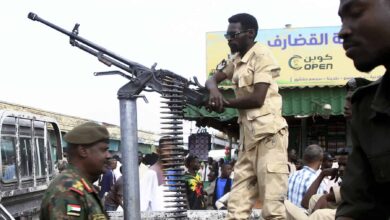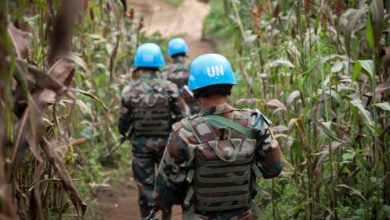The U.N. Security Council unanimously passed a resolution on Friday, September 21 aimed at toughening the response to peacekeeper misconduct following a string of failures by the blue helmets to protect civilians.
U.N. peacekeeping missions are facing a damaging wave of allegations of sex abuse and of failing to come to the aid of civilians caught up in violence, notably in the Central African Republic and South Sudan.
The United States presented the measure to improve peacekeeping performance but faced resistance from Russia, China and other nations, which found it harsh toward troop-contributing countries.
A council diplomat described negotiations on the text as “very tough” and said there had been changes to the original draft.
The resolution is intended to reinforce measures such as repatriating peacekeepers and withholding U.N. payments for soldiers involved in misconduct – penalties that have irked troop contributors.
Stressing the need to improve posture, behaviour, leadership, initiative and accountability at all levels, the resolution reaffirms Security Council support for the development of a comprehensive policy framework that identifies standards of performance and benchmarks for evaluating U.N. peacekeeping personnel to ensure accountability.
That accountability should incorporate “a range of responses proportionate to the identified performance failures,” including withholding reimbursement, repatriating or replacing units, as well as revocation of delegated authorities, change of duties, or dismissal. The resolution requests that these decisions are “predicated on objective performance data.”
It welcomes member states’ commitment to support improved training and capacity building activities to strengthen peacekeeping, and calls on the Secretary-General to ensure that U.N. missions have capable and accountable leadership, including through improving selection processes, training and mentoring.
The measure also welcomes initiatives by U.N. Secretary-General Antonio Guterres to set up special investigations, and requests that he “act with urgency” to look into significant alleged peacekeeping failures, stressing that the findings of these probes should be transparent.
The resolution requests that Guterres include in his reports on peacekeeping missions a summary of actions taken to improve mission performance and address performance challenges.

Resolution ‘creates real accountability measures’
Speaking after the its adoption, U.S. Ambassador to the U.N. Nikki Haley said the resolution “mandates a timely and transparent reporting process for performance failures.”
“It creates real accountability measures for when these failures occur. And it applies objective criteria – data, not politics – to match the right police and troops with the right peacekeeping roles,” Haley said.
U.S. President Donald Trump’s administration has taken a hard line on U.N. funding, cutting contributions and pushing for cost-saving reforms.
In July, U.N. member countries agreed a peacekeeping budget of just under $6.7 billion. The top contributors to peacekeeping funding are the U.S. with 28.5 percent, China with 10.3 percent Japan with 9.7 percent, Germany and France with 6.3 percent each, and the U.K with 5.8 percent.
But in March, Haley said other countries need to “step up” and pay a larger share. She said Washington would cap its contribution to 25 percent, which has been U.S. law since the 1990s but has been waived in the past.

Troop contributors warn of cost-cutting and inadequate resources
Haley first presented the draft Security Council resolution at a meeting on September 12.
At that meeting, Russia and China cautioned that the views of troop-contributing countries must be taken into account and called for improved training of peacekeepers, instead of penalties.
Bangladesh, the second highest peacekeeping troop contributing country, emphasised that performance is “inextricably linked” to the allocation sufficient resources and personnel, saying that “using alleged performance failures as grounds for cost-cutting and force reduction may help score political gains, but hardly responds to the interest of those peacekeeping missions are mandated to serve.”
Pakistan, another of the top troop contributors to peacekeeping, spoke against a public “name-and-shame” approach to call out countries whose troops failed in their mission. Its representative said peacekeeping missions lacked adequate resources and were burdened with too many tasks.
Russian Ambassador Vassily Nebenzia said the council should not become involved in “micro-management” and that peacekeeping missions should have “very clear mandates with emphasis on the political settlement.”
He suggested that the council could show support for improved performance through a statement instead of a binding resolution, and warned about penalizing troop-contributing countries.

According to U.N. Department of Peacekeeping Operations figures for August, 90,375 personnel were serving on 14 missions worldwide.
Although it is the top financial contributor to peacekeeping, the U.S. lags significantly in terms of its troop contribution, ranking 75th out of the 122 countries. A total of 55 American personnel were deployed on peacekeeping missions – nine police officers, three experts on mission and 43 staff officers – the lowest of the five permanent members of the Security Council.
Russia didn’t rank significantly higher – it had 75 personnel deployed, putting it in 68th place, while the U.K. had 695 personnel deployed (32nd place) and France had 743 (31st).
Of the five, China had the most personnel deployed – a total 1,968, putting it in 13th place overall.
Troop contribution to U.N. missions in August was clearly split in geographic terms. Of the top 20 troop contributing nations, 14 were African, six were Asian, and one – Italy – was European.

Declaration of Shared Commitments on UN Peacekeeping
Guterres has vowed to toughen the U.N. response to sexual abuse committed by the blue helmets and has appointed a victims’ advocate to oversee the handling of cases.
As of September 21, a total of 136 out of 193 member states have endorsed the Declaration of Shared Commitments on U.N. Peacekeeping, ahead of a high-level meeting on peacekeeping on September 25 during this year’s General Assembly General Debate.
The declaration is key element of Guterres’ Action for Peacekeeping initiative to to strengthen support for peacekeeping operations. It is based on months of consultations with member states as well as international and regional organizations and reflects their commitment, representing collective action to strengthen peacekeeping.
Guterres’ predecessor Ban Ki-moon took the unprecedented step of firing the commander of Minusca, the U.N. mission in the Central African Republic over his handling of dozens of cases of sex abuse and misconduct by the peacekeepers.
Ban also sacked the head of UNMISS, the mission in South Sudan, following a report that showed peacekeepers failed to respond to appeals for help from aid workers who came under attack at a hotel compound near a U.N. base in Juba in July 2016.
On September 6, a South Sudan military court found 10 soldiers guilty of raping five foreign aid workers and murdering a local journalist during the fighting in Juba.
Two soldiers were sentenced to life in prison for the murder of local journalist John Gatluak, as well as rape and other crimes. The others received sentences ranging from seven to 14 years for charges including rape, sexual harassment and looting.
With reporting from AFP






